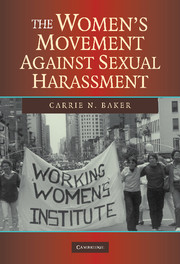Book contents
- Frontmatter
- Contents
- Figures
- Acknowledgments
- Organizational Abbreviations
- Introduction: Enter at Your Own Risk
- PART I RAISING THE ISSUE OF SEXUAL HARASSMENT
- 1 Articulating the Wrong: Resistance to Sexual Harassment in the Early 1970s
- 2 Speaking Out: Collective Action against Sexual Harassment in the Mid-1970s
- 3 A Winning Strategy: Early Legal Victories against Sexual Harassment
- PART II GROWTH OF A MOVEMENT AGAINST SEXUAL HARASSMENT
- PART III THE MOVEMENT'S INFLUENCE ON PUBLIC POLICY
- Conclusion: Entering the Mainstream
- Appendix A Time Lines of Significant Events
- Appendix B Glossary of Select Cases
- Notes
- Bibliography
- Index
2 - Speaking Out: Collective Action against Sexual Harassment in the Mid-1970s
from PART I - RAISING THE ISSUE OF SEXUAL HARASSMENT
Published online by Cambridge University Press: 14 June 2019
- Frontmatter
- Contents
- Figures
- Acknowledgments
- Organizational Abbreviations
- Introduction: Enter at Your Own Risk
- PART I RAISING THE ISSUE OF SEXUAL HARASSMENT
- 1 Articulating the Wrong: Resistance to Sexual Harassment in the Early 1970s
- 2 Speaking Out: Collective Action against Sexual Harassment in the Mid-1970s
- 3 A Winning Strategy: Early Legal Victories against Sexual Harassment
- PART II GROWTH OF A MOVEMENT AGAINST SEXUAL HARASSMENT
- PART III THE MOVEMENT'S INFLUENCE ON PUBLIC POLICY
- Conclusion: Entering the Mainstream
- Appendix A Time Lines of Significant Events
- Appendix B Glossary of Select Cases
- Notes
- Bibliography
- Index
Summary
Collective action against sexual harassmentwas rooted in thewomen'smovements, emerging at the intersection of activism against employment discrimination and feminist opposition to violence againstwomen. The issue of sexual harassment brought together twoof contemporarywomen's deepest,most troubling concerns – their desires for an unbiased workplace and their fears of male sexual aggression. Activists within the women's movements formed two organizations that focused primarily on sexual harassment in employment and that were heavily responsible for generating the movement against sexual harassment in the 1970s –Working WomenUnited in Ithaca,NewYork,which later relocated to NewYork City and became Working Women's Institute (WWI), and the Alliance Against Sexual Coercion (AASC) in Cambridge, Massachusetts. The founders of these organizations were influenced by the early lawsuits and, in turn, their success in raising awareness of sexual harassment buttressed the appeals in these cases. These new organizations not only relied on existing organizations and networks, but also generated new networks and framed the issue of sexual harassment as an important feminist issue. This nascent movement engaged in initial ‘interpretive processes’ that allowed them ‘to reject institutionalized routines and taken for granted assumptions about the world and fashion new world views and lines of interaction.’
WORKING WOMEN UNITED
The formation of Working Women United in the spring of 1975 was inspired by the case of Carmita Wood. Wood, a forty-four-year-old mother of four, had been denied unemployment compensation after she resigned as an administrative assistant to a Cornell professor because she had become physically ill from the stress of fending off his sexual advances. Wood had begun working at Cornell University in 1966, had an outstanding work record, and was promoted to be the first female administrative assistant at Cornell's Laboratory of Nuclear Studies in 1971. According to Wood, shortly after she began working in the lab, a well-known physicist named Boyce McDaniel began to sexually harass her. Wood described McDaniel as a ‘dirty old man’ who did not want her on the job and who treated women as ‘second-class citizens, and inferior beings.’
- Type
- Chapter
- Information
- The Women's Movement against Sexual Harassment , pp. 27 - 48Publisher: Cambridge University PressPrint publication year: 2007



